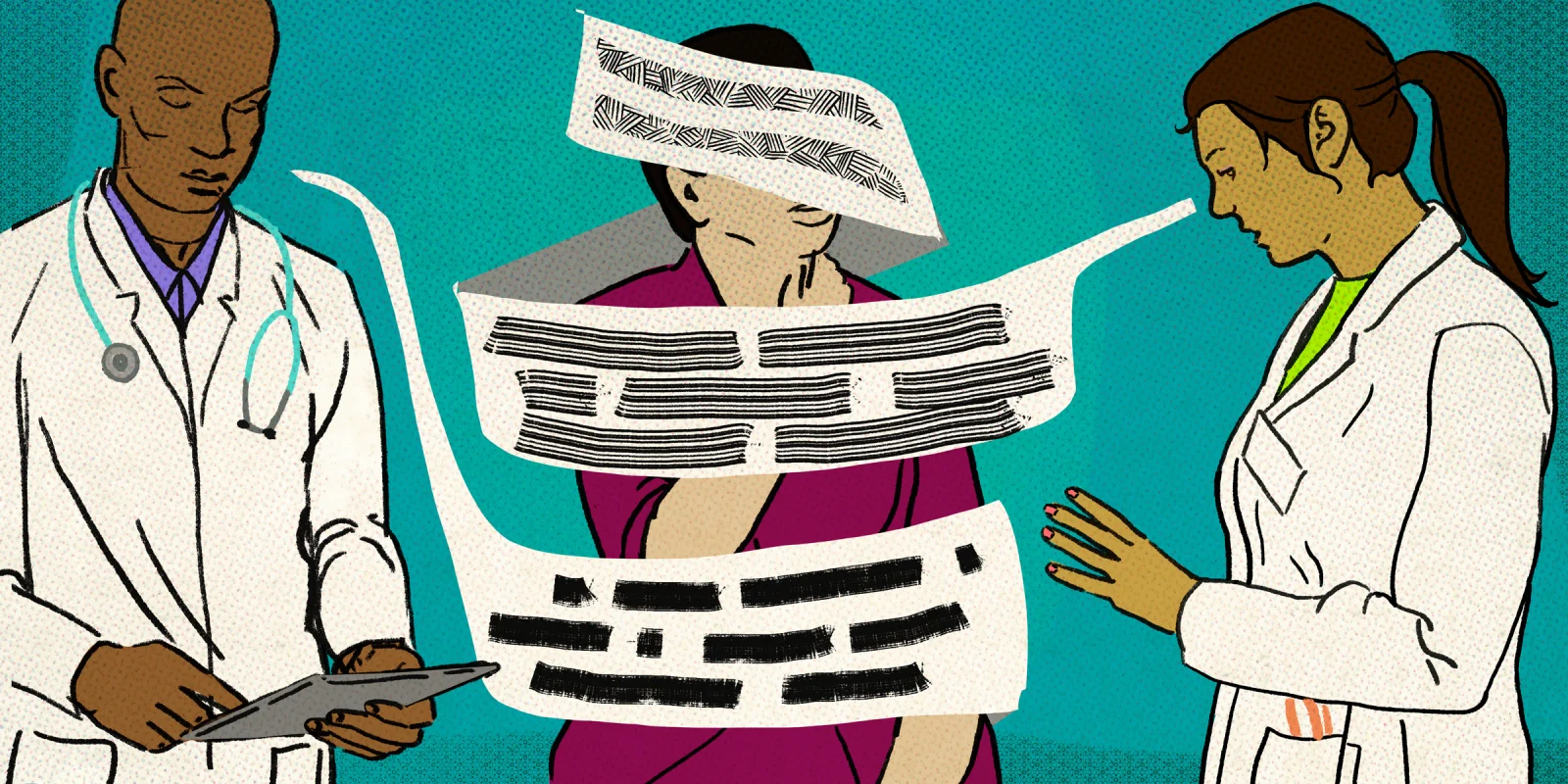Before I went to medical school, I thought that having a “history” meant you had something dark, shady, and potentially illegal lurking in your past.
Before I went to medical school, I thought a “complaint” was something whiny people brought up when they wanted to be annoying.
Before I went to medical school, I thought an “insult” was a rude statement made with malicious intent, the kind meant to wound someone else.
I’d never heard the phrase “shortness of breath.” I thought “abdominal” referred to 6-pack muscles, “palpitations” was a colorful descriptor for anxiety, a CT scan was pronounced “cat scan,” a fracture was the “lite” version of a broken bone, and “GI” was supposed to be followed by “Joe” or “Bill.” And it’s not as though I didn’t have a background in science: I had double majors in biological sciences from a top-tier university, worked in biomedical research for close to five years, had loved ones with medical problems, and had family members who were doctors.
Fast forward a few years, and I’m a third-year psychiatry resident. I had a new patient, Charles, an 80-year-old man with a history of severe bipolar disorder type 1, though he had not had an episode in decades. He initially consulted me for anxiety and trouble sleeping in the context of retiring from his career as a professor and grappling with feelings of obsolescence in his advancing age. However, the day before his first appointment, his primary care doctor incidentally found a mass on his liver. I also noticed at our initial appointment that he was exhibiting mild signs of dementia. As Charles started undergoing endless medical testing, his dementia progressed rapidly; therapy moved from dynamic to supportive, and I spoke frequently with his wife. They both expressed frustration that they were not getting test results back and that Charles’ primary care doctor (who was managing care while they waited to get in with an oncologist) didn’t return their calls; I too had difficulty getting through to him. Eventually, Charles’ wife told me they’d received results.
“The doctor told us yesterday that they know what it is now — a malignant mass.”
“Oh my goodness, I’m so sorry,” I said. “How are both of you dealing with the cancer diagnosis?”
“Cancer?” she asked, shocked. “The doctor didn’t mention that.”
I froze, shocked for a very different reason. I asked more questions and found out the doctor had used the words “malignant mass,” but had never used the word “cancer.” I was willing to allow that perhaps they hadn’t heard everything the doctor said, which can happen when receiving very shocking, very bad news; it’s the mind’s way of dealing with the unthinkable. But as a pattern of similar conversations unfolded over the weeks, I was less willing to give the benefit of the doubt. And if Charles and his wife, highly educated professors, weren’t able to understand what the oncologist was saying, how could the layman patient be expected to understand? How many other patients were out there, making their way through their cancer diagnosis blindfolded?
Another week: “They said that they can’t find a treatment for him because they still haven’t been able to identify the primary cancer,” the wife told me. “But wasn’t the primary cancer the liver mass?” And there I was again, explaining “primary tumor” and its implications on treatment in plain language — in a psychiatry appointment.
Other questions came up over the weeks. The oncologist, for example, didn’t discuss the impact of Charles’ cancer on his mental and cognitive state. Why was I, his psychiatrist, the one walking Charles through possibilities like metastasis to the brain, or the effects of cancer stealing nutrients from his body? Another week, talking with Charles’ wife, she mentioned that four days prior he had fallen getting out of bed. I told her that she should go to the ER to make sure he didn’t have a head bleed. “Why?” she asked. I had my own, different “why” questions: Why hadn’t the palliative care doctor or oncologist talked about what to do if he fell as he became weaker? Why hadn’t the oncologist explained that cancer can cause coagulopathies that might make it even more dangerous for Charles to fall than for other elderly people?
To be clear, I don’t think that the doctors weren’t explaining his illness and its progression. I don’t think they meant to leave Charles and his wife in the dark or to confuse them. But as his course continued, it became clear that his doctors were explaining things in language that even highly educated individuals couldn’t understand, weren’t eliciting questions, and weren’t eliciting understanding after answering questions that had been asked without prompting. When the oncologist stopped seeing them and turned Charles’s care over to the palliative doctor, they were confused about why curative treatment hadn’t been offered. I don’t think the oncologist didn’t explain why palliative care would be the more appropriate primary team — I just don’t think that the words she used were words that my patient and his wife could understand. I never thought that as a psychiatrist I would be the one giving somebody a diagnosis of terminal cancer over Zoom. But for want of just plain language, that’s exactly what I found myself doing.
Recently, in an unrelated case, I was observing a pediatrician who I respect and who I’ve seen interact with families gently, respectfully, and compassionately. It was a tense, high-stress pediatric visit following treatment for an arm injury, potentially caused by child abuse. The conversation went like this:
Doctor: “So, we saw on the X-ray that your baby’s femur looks somewhat abnormal. The radiologist says it could mean that he had CMV early in his life, or it could be a normal variant. Do you know if any bone diseases run in the family?”
Mom (with concerned facial expression): “No … I …” She took a deep breath and started to say something, but then —
Doctor: “OK, then it’s probably just a normal variant and we can get X-rays in a couple of weeks to follow up. So let’s look at that arm, sweetie!”
Whoa! What just happened? I thought to myself. Does Mom know what a femur is? Does Mom know what CMV is? Does she even know it’s three letters or did it sound like one word: seeyemvee? How is she supposed to know what a bone disease is? And a “variant?” That kind of sounds like … I don’t know what, but definitely not something you want your kid to have. I don’t want my kids varying from normal, whether it’s normal varying or not. And if that sounds confusing, that’s because it is. If I were that mom, I think I would have a lot of questions, and wouldn’t be reassured by one quick sentence.
Is it easy to make sure you’re using layman’s terms all the time? Of course not. It’s never easy to code-switch. It’s difficult to go from writing a note or talking to a colleague in one version of English, and then turn around and talk to a patient in another version of English. But people have to code-switch all the time for different reasons. I would argue that just as we have a duty to serve our patients the best we can by doing things like keeping up with the latest research, practicing standard of care, practicing good antibiotic stewardship, etc., it is a non-negotiable responsibility that we learn to code-switch so as to communicate equally effectively with patients and colleagues. The onus is on the doctor to make sure the patient understands, not on the patient to de-code or look up the doctor’s jargon.
The data supports my argument, too. Multiple studies have looked at the use and effects of medical jargon, from medical terminology and contextual jargon (words that mean something different in common English, like “complaint”), to overly complex language (20% of American adults read at or below a fifth grade reading level) and mathematical concepts (in one study many patients with at least a high school education were still unable to explain what a “9% risk” meant). A minority of doctors (11% in one study) use strategies like checking for understanding during discussions. In a randomized controlled trial, 80% of patients said they could better manage their health problems when a letter of communication from their doctor was “translated” into plain English. Further, patients often leap to the worst conclusion; in a study about conveying findings of a pulmonary nodule, almost every patient thought they had cancer — but several of the doctors didn’t even mention cancer when explaining results. When medical jargon is used, patients suspect their doctors are trying to avoid them, confuse them, or exclude them from care. They also perceive those doctors as less empathetic and less professional. Code-switching is imperative in allowing patients to make informed choices about their care, plan for the future, follow up appropriately, and trust their doctors — all of which produce better outcomes.
In short: saying things in plain language can save not just lives, outcomes, and stress, but also years of torment. Someone I’m close with, now in her 60s and married for over 30 years, confided to me that she still felt constant guilt that she hadn’t been at her first husband’s bedside in his last moments. He had died of cancer when they were in their 20s. “The doctor told me he was very sick, but I already knew that. I didn’t know he meant my husband was about to die. We were very poor and I was at work all night. When he called and told me my husband had died, I said, ‘Why didn’t you tell me?’ and he said, ‘I did tell you.’ I was angry and I said, ‘No you didn’t, you just said he was very sick.’ I didn’t say anything more, but in my mind, I thought How was I supposed to know that ‘very sick’ meant ‘dying’?” She was shocked and relieved when, upon telling me this story 40 years later, I told her she wasn’t supposed to have known that. The doctor was supposed to have told her the plain truth in plain words.
Forty years of guilt and shame, for want of plain language. A heavy cost that could have been avoided by code-switching.
Are there medical words or phrases you’ve found especially require translation to “patient language”? Share them (and your translation) in the comments.
Dr. Carolyn Rosinsky is a child/adolescent psychiatry fellow at Children's National Medical Center/George Washington University and completed her general psychiatry residency at University of Maryland/Sheppard Pratt. She is also a professional cellist and maintains an active career performing and teaching. Dr. Rosinsky is a 2021–2022 Doximity Op-Med Fellow. All names and identifying information have been modified to protect patient privacy.
Illustration by Jennifer Bogartz







